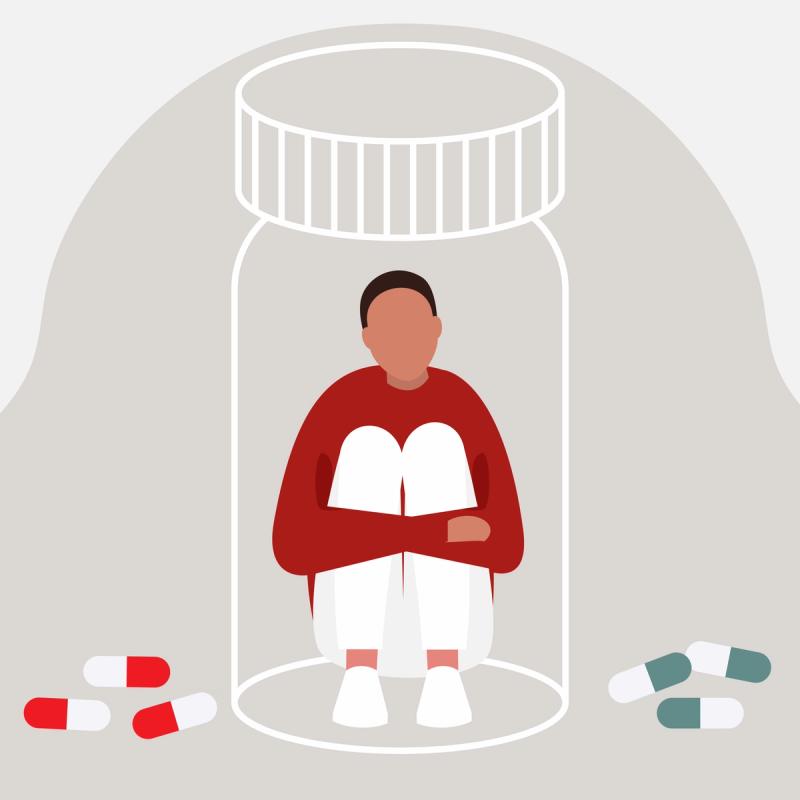When treating conditions like anxiety and depression, finding the right medication is crucial. Bupropion, the generic version of Wellbutrin®, and escitalopram, the generic version of Lexapro®, are two commonly prescribed medications for these mental health conditions.
While both drugs are classified as antidepressants, they work differently in the brain and are prescribed for various conditions. Understanding the differences between bupropion and escitalopram can help you make informed treatment decisions.
Learn about the mechanisms of action, conditions treated, effectiveness, side effects, and the possibility of using these medications together.
Key Takeaways
Both bupropion (Wellbutrin®) and escitalopram (Lexapro®) are prescription antidepressants, but they work differently in the brain and may treat different symptoms of depression and anxiety.
Bupropion is often chosen for people who want to avoid sexual side effects or who are looking for help with energy, focus or quitting smoking.
Escitalopram is typically used to treat both depression and generalized anxiety disorder. It may be preferred for people who struggle with restlessness, excessive worry or physical symptoms of anxiety like muscle tension.
What is bupropion (Wellbutrin®)?
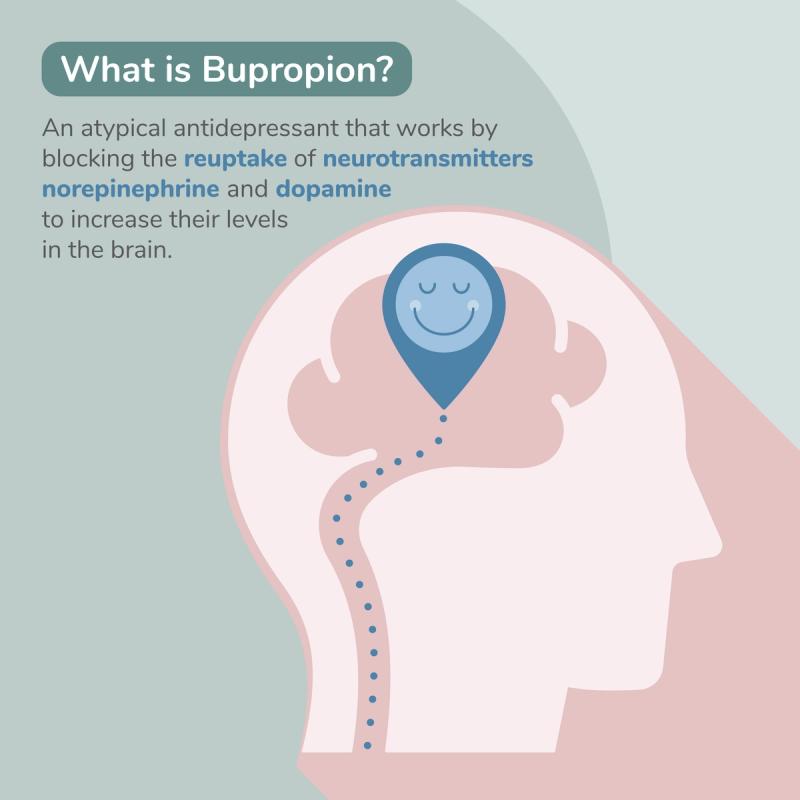
Bupropion, the generic version of Wellbutrin®, belongs to a class of medications called atypical antidepressants. It works by blocking the reuptake of neurotransmitters norepinephrine and dopamine to increase their levels in the brain.1
Bupropion is prescribed to treat various conditions including anxiety, depression, seasonal affective disorder, and adult ADHD. It is also prescribed as a smoking cessation aid.2
What is escitalopram (Lexapro®)?
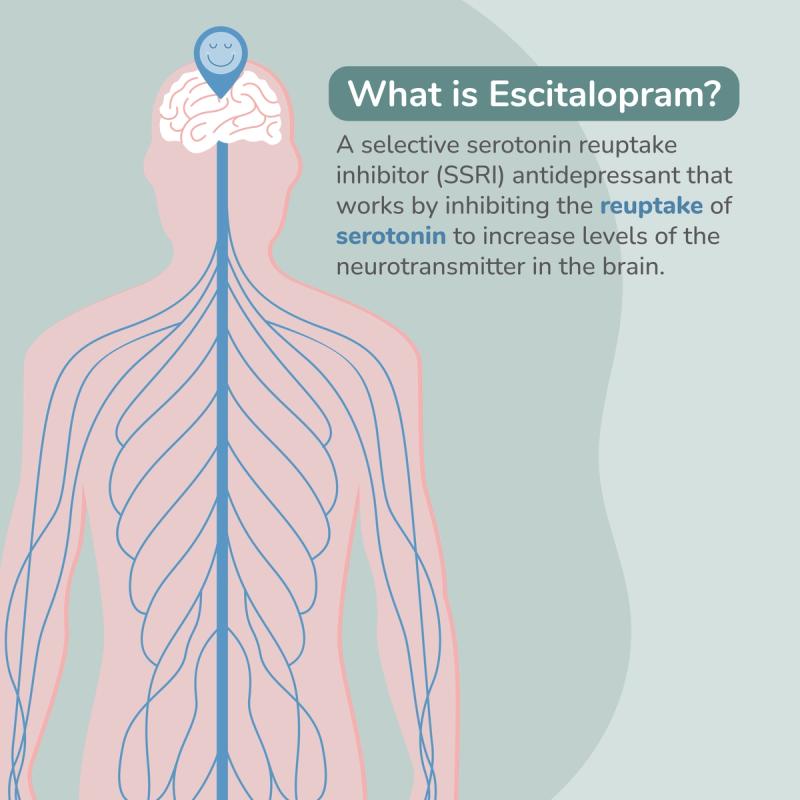
Escitalopram, the generic version of Lexapro®, is part of a classification of antidepressants called selective serotonin reuptake inhibitors or SSRIs. It works by inhibiting the reuptake of serotonin to increase levels of the neurotransmitter in the brain.
Escitalopram is prescribed for anxiety, depression, obsessive-compulsive disorder (OCD), post-traumatic stress disorder (PTSD), as well as some menstrual and menopausal disorders.3
What’s the difference between bupropion and escitalopram?
While bupropion and escitalopram have some crossover in the conditions they treat, the mechanisms of how they work in the brain are different. Bupropion is a norepinephrine and dopamine reuptake inhibitor (NDRI) while escitalopram inhibits serotonin uptake. The medications can provide different results depending on the users’ chemical balances in the brain.
Can bupropion and escitalopram be used to treat both anxiety and depression?
Both bupropion and escitalopram are prescribed for anxiety and depression. Bupropion is FDA-approved and primarily prescribed for treating major depressive disorder, seasonal disorder and smoking cessation. Escitalopram is FDA-approved and primarily prescribed for anxiety, generalized anxiety disorder, major depressive disorder and depression.4
How effective are bupropion and escitalopram?
Both bupropion and escitalopram have been shown to be effective in treating the symptoms of depression, anxiety, and adult ADHD.
In a meta-analysis of 27 clinical studies of bupropion, 24 of the 27 trials reported a significant reduction of depression symptoms in participants.5 A different study of people with dysthymic disorder, a chronic low-grade depression, 71.4% of participants responded positively to a trial of bupropion. When studied for the treatment of adult ADHD, 76% reported an improvement with bupropion.6 Bupropion has been shown to treat anxiety as well as SSRIs in some trials.7
In studies of escitalopram, approximately 80% of participants reported improvements in their symptoms of depression with anxiety.8 When compared to other SSRIs, escitalopram performed better in studies for the treatment of overall major depressive disorder.9
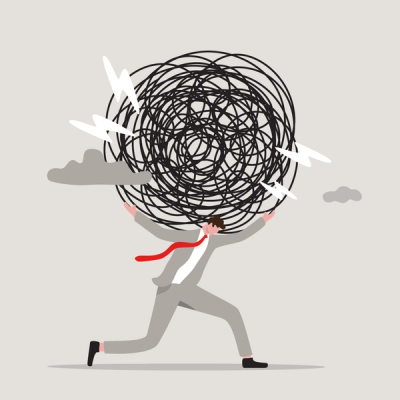
Your mental health is important.
Get personalized anxiety and depression treatment online when you need it – we offer a flat rate doctor consult, no membership fees, and no wait.
Get StartedHow do the side effects compare for bupropion and escitalopram?
One of the major differences between bupropion and escitalopram is the side effects. The two medications have some overlapping side effects as well as some differing side effects.
Common side effects of bupropion include:10
Insomnia
Nausea
Sore throat
Weight Loss
Constipation
Common side effects of escitalopram include:11
Insomnia
Nausea
Diarrhea
Drowsiness
Sexual dysfunction
Headache
Can bupropion and escitalopram be used together?
Bupropion and escitalopram can be safely used together. In some instances, the results of using bupropion and escitalopram have been more effective than one of the medications alone.
As many as 46% of users do not respond appropriately to antidepressants alone, so medical providers often augment an SSRI with another medication. Bupropion is the most widely chosen augmentation agent to pair with SSRIs, like escitalopram, in the U.S. and Canada.12
Are bupropion or escitalopram available over the counter?
Both bupropion and escitalopram require a prescription from a licensed medical professional. You cannot buy bupropion or escitalopram over the counter.13 Telehealth providers like RedBox Rx offer anxiety and depression treatment online and can prescribe bupropion or escitalopram, if appropriate.
Bupropion (Wellbutrin®) vs. Escitalopram (Lexapro®) Comparison Chart
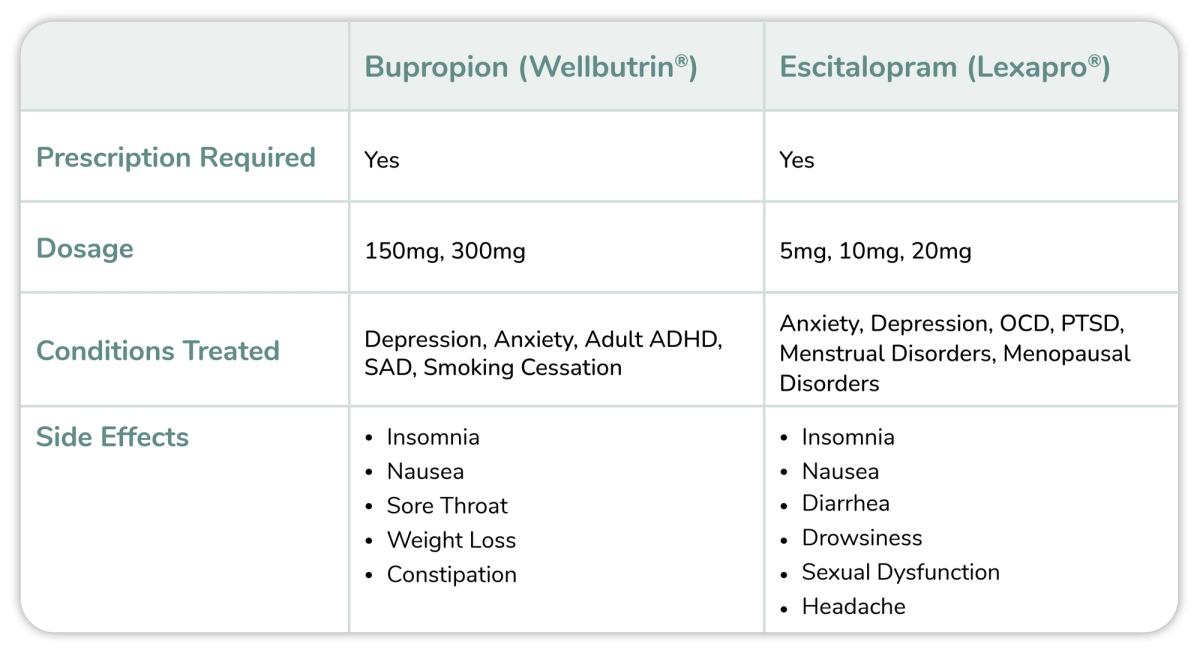
How RedBox Rx can help
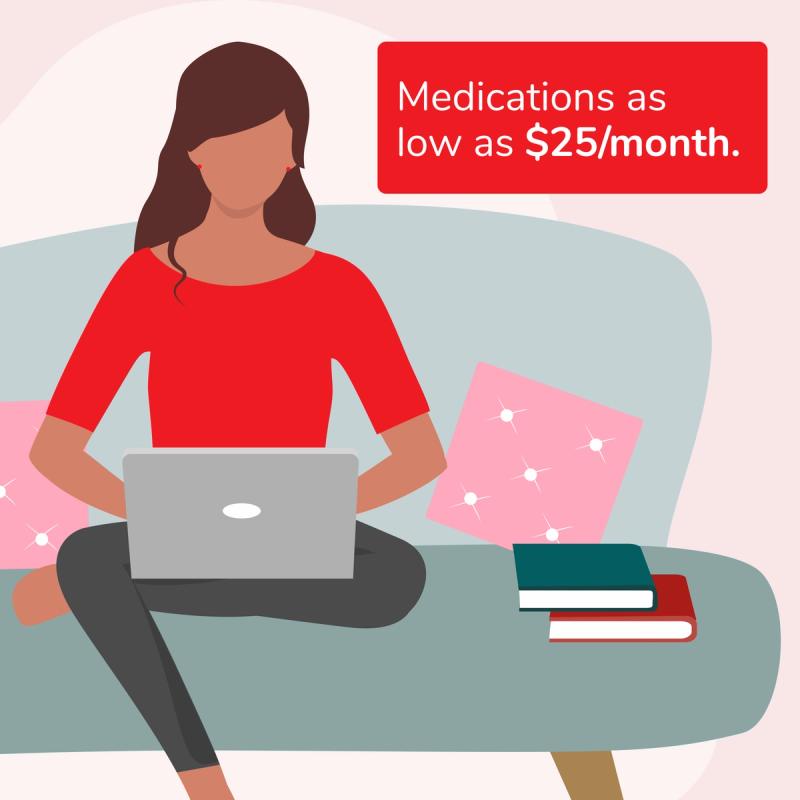
RedBox Rx makes receiving a prescription for bupropion or escitalopram easy and affordable.
Benefits of RedBox Rx include:
Transparent, affordable, flat rates for medications starting at $25/month (with purchase of 3-month supply).
$35 consultations with a U.S. licensed medical professional.
No insurance required. FSA and HSA eligible.
No office wait times or scheduling issues typical with physical medical practices.
FREE shipping directly to you. Monthly and quarterly subscriptions available.
Get started on your depression and anxiety treatment journey with our assessment.
If you are experiencing suicidal or self-harm thoughts, please reach out immediately to a health care provider or call the National Suicide Prevention Lifeline at 1-800-273-8255.

